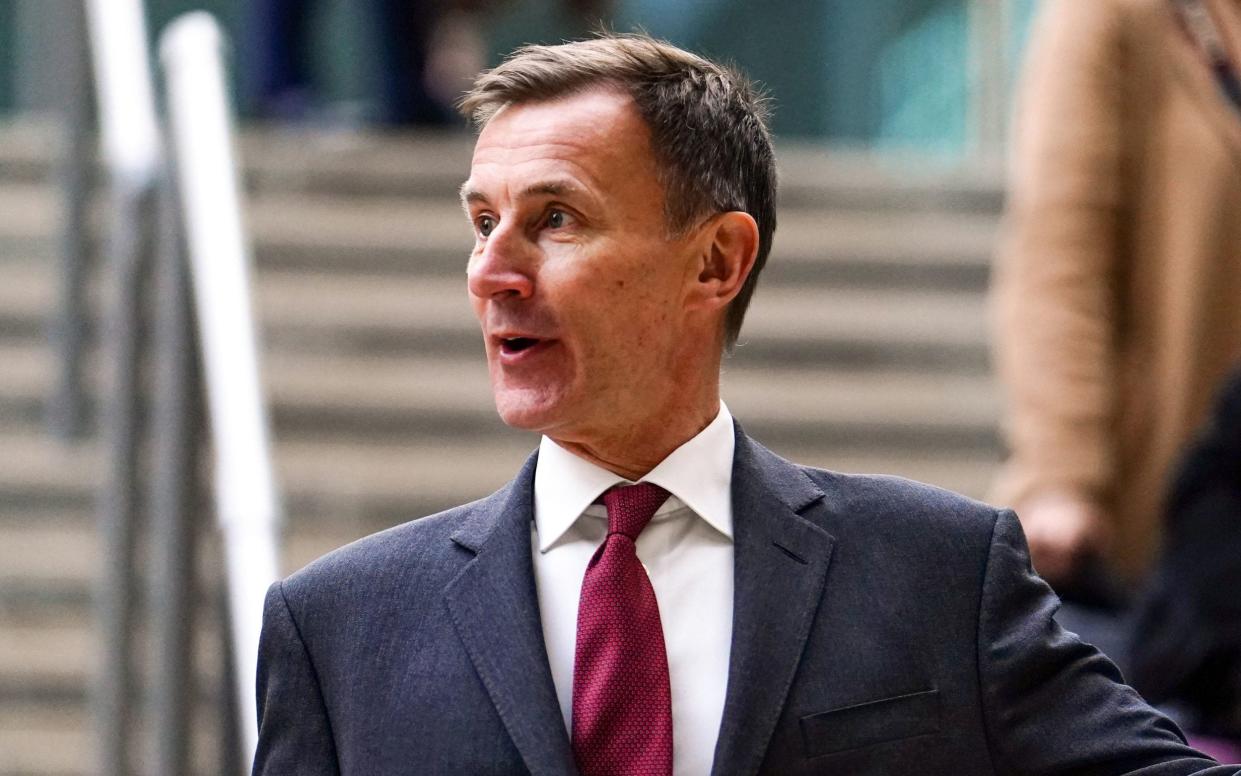Energy bailout to cost half as much as feared

The estimated cost of the Government’s energy support package has been halved in a boost for hopes that Jeremy Hunt can cut taxes in his next Budget.
Ministers now expect to spend £69bn on subsidising households' and businesses' bills during the crisis, down from a previous prediction of £139bn.
The Resolution Foundation think tank said the falling bill gives the Chancellor more fiscal headroom when he lays out his plans next month.
Sir Iain Duncan Smith, the former Conservative Party leader, said the savings on energy support meant that corporation tax increases coming this spring should be scrapped.
He said: “We need to carefully adjust our position. Number one, we should do no more harm, which means we shouldn’t be increasing corporation tax this spring.
“Number two, we need a new plan which should be supply side reforms and tax cuts well before the end of this year to focus on economic growth.”
The Government has been subsidising household and businesses energy bills since October 2022 in an attempt to ease the cost of living crisis, following a surge in wholesale energy prices after the invasion of Ukraine.
Rishi Sunak, while chancellor in May, put in place a plan to give each household £400 towards their energy bills between October 2022 and March 2023.
Liz Truss boosted the level of support when she became prime minister in September, with measures to limit typical household energy bills to £2,500 per year and cap businesses bills too. Vulnerable groups such as the elderly were also given extra help.
All this support was previously expected to cost the taxpayer as much as £139bn, according to a report by the National Audit Office (NAO).
However, the help on offer was scaled back by Mr Sunak when he became Prime Minister, becoming less generous for households from this April.
Meanwhile, wholesale gas prices have dropped significantly as mild weather lowered demand and Europe managed to fill storage stocks ahead of winter.
UK gas futures are now trading below 150 pence per therm, compared to highs of 600p in August. The long-term average has been around 50p.
In a report on Tuesday, the NAO said the Government’s current estimate is £69bn due to “an increase in the level to which bills are reduced [...] changes in wholesale gas price and changes in energy demand.”
The estimate covers the life of the schemes, from October 2022 to April 2024.
It stressed that estimates are inherently uncertain with the final costs still dependent on volatile energy prices as well as “how much energy people and businesses consume and the prevailing temperatures”.
Under the scheme to support households, the Government has limited typical bills to £2,500 per year, rising to £3,000 per year in April.
The state pays suppliers the difference between this rate and the rate they would have been allowed to charge under Ofgem’s price cap, which reflects wholesale costs.
This has risen sharply, from £1,971 in April 2022 to £3,549 per year in October 2022 and £4,279 per year in January 2023.
Cornwall Insight, an energy market analyst, forecast on Monday that the cap will fall to £3,338 in April, followed by £2,361 in July and £2,389 in October.
That would leave the state facing a bill for household support of £338 per household between April and July, falling to zero after that.
Emily Fry, an economist at the Resolution Foundation, said: “The cost of living crisis is far from over, but falling gas prices mean that it’s looking less bleak than just a few months ago.”
However, early data suggest a windfall tax on oil and gas companies is already raising less than expected amid warnings that the growing tax burden on businesses is hampering investment in Britain.
The cash haul from the Energy Profits Levy (EPL) was £600m less than the Office for Budget Responsibility expected in December.
Lower wholesale energy costs will reduce receipts from the levy by an estimated £7bn next year, the Resolution Foundation said.
Julian Jessop, an independent economist who advised Liz Truss during her Tory leadership campaign, urged Mr Hunt to use the money to cut taxes now.
He said: “This exposes a huge inconsistency in the Treasury's logic.
“We are constantly being told that taxes need to go up to fill a notional hole in the public finances, But then when that hole is revised away, they move the goalposts.
"If you think the tax burden is too high, why wait? It makes no sense at all to raise taxes when the economy is teetering on the brink of recession."
Douglas McWilliams, a former adviser to George Osborne when chancellor, said the planned rise in corporation tax from 19pc to 25pc this April should be cancelled.
He said: "The biggest problem in the UK at the moment is we've gone anti-growth and we desperately need to do something to encourage investment."
Mr Hunt has so far resisted calls to reduce the tax burden on households and businesses, admitting that “we need lower taxes” but that “sound money must come first”.
A Treasury spokesman said: “Falling wholesale prices will ease pressure on energy bills but mean that tax receipts will be significantly lower, with any savings wiped out next year. It would also be irresponsible to plan fiscal policy on such volatile prices.
“The typical household has received £1,300 to help with energy bills this winter and more support is on its way, with millions of vulnerable households getting £1,350 in direct cash payments and benefits rising by over 10pc in April.
“Meanwhile, our plan to halve inflation this year will help everyone’s money go further.”

 Yahoo Movies
Yahoo Movies 
